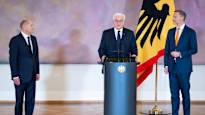The contentious and unpopular government coalition collapsed due to disagreements over the economy. The government will be remembered for its weakness, writes ‘s foreign correspondent Leonard Wilhelmus.
Leonard Wilhelm, foreign journalist
While Germany, like the rest of the world, was still digesting the results of the US election, the country’s chancellor Olaf Scholz dropped a real news bomb.
Scholz said on Wednesday evening that he will dismiss the government’s finance minister by Christian Lindner. It meant the breakup of the three-party government coalition.
There are early elections ahead, which Scholz wants only in March, the opposition earlier. In the midst of world political turmoil, Germany no longer has a functioning government.
The politics of the European powerhouse is in crisis and its economy is collapsing.
Ideological differences between governing parties economic issues marked the entire three-year reign.
Scholz’s social democratic SPD and the Greens wanted a more revitalizing and more left-wing economic policy. However, it did not happen to the third government partner, Lindner’s economic right-wing liberal party FDP.
This is how Scholz announced Lindner’s dismissal:
The financial disagreements might have been resolved if the economy had been doing well.
However, that did not happen.
The German economy hasn’t grown in two years, and the future doesn’t look bright either. It is telling that Volkswagen, the crown jewel of export-driven Automaa, is planning to close its factories in Germany for the first time.
So the government ended up sharing the scarcitywhich brought out the ideological differences between the parties more clearly.
The government’s unpopularity was increased by the energy crisis caused by the Russian war of aggression and the sharp rise in prices.
Without cheap Russian energy, the bottom fell out of Germany’s economic miracle. Europe’s economic locomotive has become a brake on Europe’s growth.
The weak economic situation is reflected in the government’s approval ratings.
The combined support of the governing parties has hovered around 30 percent. In many polls, the support of the FDP, which left the government, falls below the five percent vote threshold needed for the Bundestag.
There had to be a government Germany’s reformer when the long era of conservative Christian Democrats in power ended.
However, the reforms remained half-hearted. The matter was made worse by the government’s confusing communication and arguing in public.
An example of the confusion is support for Ukraine. Germany has indeed supported Ukraine significantly, but Scholz’s constant stalling of arms aid has taken away its credibility.
When Europe needed a trend setter, Germany didn’t. The image of a weak Germany remained alive.
Of course, Scholz led Germany into a new era in terms of foreign policy, as he promised immediately after the start of the large-scale war of aggression against Russia.
Under his leadership, Germany abandoned its post-World War II principle of not arming a country at war. Scholz also promised 100 billion euros to strengthen his country’s defense forces.
However, the reform of the army has progressed slowly, and Germany’s defense has not been repaired to be credible.
Half-wool, too.
